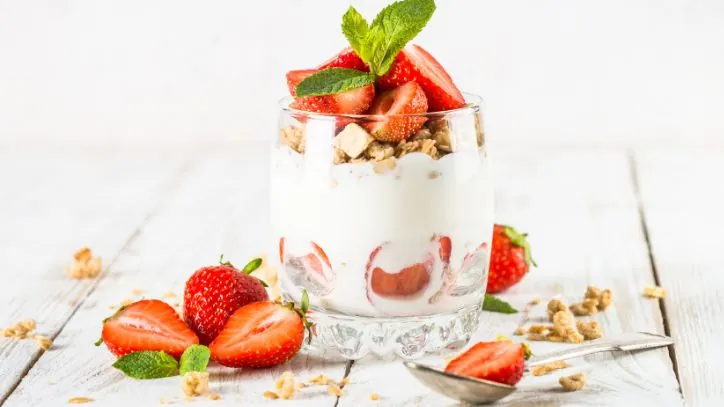Blog
Get Your Protein at Breakfast

We’ve all heard that breakfast is the most important meal of the day. It sets the tone for how we feel, focus, and function throughout the day. After all, it is the meal that breaks the fast we’ve been holding all night while we slept. Since this is the first meal your body eats after that fast, it’s essential to pack it with enough protein to give you a boost of energy that will last throughout the day.
Why Is Protein So Important?
Protein is a macronutrient that is essential for numerous bodily functions. It plays a crucial role in cell maintenance and repair, helps preserve muscle mass, and serves as a building block for bones, skin, and other body tissues. More importantly, protein is responsible for providing the nine essential amino acids that our bodies cannot produce on their own. These amino acids are vital for creating hormones, enzymes, and other important body chemicals. For a deeper dive on the functions of protein in the body, you can check out resources from the National Institutes of Health that discuss protein’s significance in human health.
When you consume protein alongside high-fiber carbohydrates and healthy fats, it helps sustain energy levels and stabilizes blood sugar. This combination can help you feel fuller for longer periods, reducing the urge to snack unnecessarily before lunch. Research published by the American Journal of Clinical Nutrition shows that a protein-rich breakfast can lead to better appetite control and weight management.
The Role of Breakfast in Your Day
Breakfast breaks the overnight fast, replenishing your glucose supply and providing essential nutrients for your day. Without a nutritious breakfast, your body may respond with cravings and fatigue by mid-morning. A breakfast that’s lacking in nutrients can send you on a rollercoaster ride of energy highs and lows, affecting your mental focus and physical performance.
Many health experts recommend making breakfast a healthy habit. The Centers for Disease Control and Prevention (CDC) supports the idea that a healthy breakfast can improve concentration and performance in the classroom and workplace, along with enabling better overall nutrition.

Optimal Protein Intake
According to the USDA’s Dietary Guidelines, about 10-30% of our daily calorie intake should comprise protein. Determining how much protein you need can depend on several factors, including age, sex, and activity level. The recommended dietary allowance (RDA) for protein is 46 grams per day for adult women and 56 grams for adult men. However, more physically active individuals, especially athletes, may require higher amounts. For excellent insights into daily protein needs, refer to the USDA Dietary Guidelines.
Breakfast is a great opportunity to meet a significant portion of your protein requirements. Many breakfast foods, such as eggs, bacon, sausage, yogurt, milk, and cheese, are rich in protein. Understanding the specific protein content in these foods can help you mix and match to meet your dietary goals. For example, a single large egg contains about 6 grams of protein, while a serving of Greek yogurt can provide up to 20 grams.
High-Protein Breakfast Options
Now that we understand the importance of protein, let’s look at some fantastic breakfast options that can help you start your day off right.
- Eggs: Versatile and packed with protein, eggs can be scrambled, poached, or made into an omelet. They are an excellent source of all nine essential amino acids. According to the Egg Nutrition Center, one large egg contains about 6 grams of protein and has beneficial nutrients like vitamin D and choline.
- Greek Yogurt: This thick and creamy yogurt offers about twice the protein of regular yogurt. One cup can contain approximately 20 grams of protein, making it a perfect base for a nutritious breakfast bowl. Adding fruits, nuts, and seeds can enhance the flavor while providing extra fiber and healthy fats. Learn more about Greek yogurt from the Dairy Farmers of America.
- Cottage Cheese: Often overlooked, cottage cheese is a protein powerhouse. One cup can have about 28 grams of protein! Combine it with fresh fruits, honey, or a sprinkle of cinnamon for a delicious and satisfying breakfast.
- Nut Butter: Spreading almond or peanut butter on whole-grain toast or oatmeal adds healthy fats, fiber, and protein to your breakfast. One tablespoon of almond butter contains about 3.5 grams of protein.
- Smoothies: Creating a high-protein smoothie is a quick way to pack in nutrients. Blend Greek yogurt or protein powder with spinach, fruits, and a nut butter for a delicious breakfast-on-the-go.
- Quinoa: While often treated as a grain, quinoa is actually a seed and contains all nine essential amino acids, making it a complete protein. A cup of cooked quinoa has about 8 grams of protein. It can be served warm or cold, making it a versatile choice.
- Oatmeal: Oats provide fiber, which is essential for digestive health, and when combined with milk or Greek yogurt, they can become a more protein-rich option. Try adding nuts or seeds to boost protein content further.
Local Agriculture and Supporting Farmers
Arizona agriculture produces many of the high-protein breakfast foods mentioned above. When shopping at your local farmers market or grocery store, look for locally produced meats, eggs, and dairy products. Supporting local farmers not only strengthens the community but also ensures you’re consuming fresher food that’s often richer in nutrients. Visit Arizona’s Farm Bureau for more on local food sources.
Supporting local agriculture has advantages beyond fresh produce. By choosing locally sourced food, you’re also contributing to the local economy and reducing your carbon footprint. Learn more about the benefits of buying local from organizations like FillYourPlate.org.
Meal Prep Ideas for Busy Mornings
Mornings can be hectic, so being prepared is key to maintaining a healthy breakfast routine. Here are some meal prep ideas for busy weekdays:
- Overnight Oats: Combine rolled oats with Greek yogurt and your favorite milk, then add fruits and nuts. Let them soak overnight in the fridge, and they’ll be ready to eat in the morning.
- Breakfast Burritos: Make a batch of egg and vegetable burritos that can be wrapped and frozen. In the morning, microwave and enjoy.
- Egg Muffins: Whisk eggs with vegetables and cheese, pour into a muffin tin, and bake. These protein-rich muffins can be refrigerated and reheated for a quick breakfast option.
- Protein Bars: Homemade protein bars made with oats, nut butter, and protein powder can be a great grab-and-go breakfast.
- Smoothie Packs: Pre-portion your smoothie ingredients (fruits, greens, and protein powder) into freezer bags. In the morning, just add your liquid of choice and blend.
Conclusion
Prioritizing protein at breakfast can significantly enhance your energy levels, mental clarity, and overall health. By incorporating a variety of high-protein foods into your morning routine, you’re not only supporting your body but also enjoying diverse and delicious meals.
Remember the importance of local agriculture when shopping for your breakfast ingredients. Local proteins – whether sourced from farms, markets, or stores – support the community and provide you the highest quality food. So next time you plan your breakfast, think about the protein you’re including and how it fuels your day.
For more information about healthy eating and personalized dietary needs, consider consulting resources like the Academy of Nutrition and Dietetics or speaking with a registered dietitian who can provide tailored advice based on your health goals.
Start your day with a protein-packed breakfast, and unlock the energy for a fruitful day ahead!


















